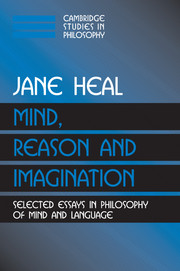Book contents
- Frontmatter
- Contents
- Preface
- Sources
- Mind, Reason and Imagination
- 1 Introduction
- PART I MIND, THEORY AND IMAGINATION
- PART II THOUGHT AND REASON
- PART III INDEXICAL PREDICATES AND THEIR APPLICATIONS
- PART IV THINKING OF MINDS AND INTERACTING WITH PERSONS
- 12 What Are Psychological Concepts For?
- 13 Moore's Paradox: A Wittgensteinian Approach
- 14 On First-Person Authority
- References
- Index
14 - On First-Person Authority
Published online by Cambridge University Press: 18 December 2009
- Frontmatter
- Contents
- Preface
- Sources
- Mind, Reason and Imagination
- 1 Introduction
- PART I MIND, THEORY AND IMAGINATION
- PART II THOUGHT AND REASON
- PART III INDEXICAL PREDICATES AND THEIR APPLICATIONS
- PART IV THINKING OF MINDS AND INTERACTING WITH PERSONS
- 12 What Are Psychological Concepts For?
- 13 Moore's Paradox: A Wittgensteinian Approach
- 14 On First-Person Authority
- References
- Index
Summary
INTRODUCTION
What people say, in the first person and present tense, about their own thoughts is treated as authoritative. This is not to say that such remarks (avowals) are unquestionable. A person's claims about her beliefs, intentions, feelings, sensations and so on can be challenged. But the doubt usually centres on the speaker's sincerity or command of language rather than on the idea of her being in plain honest error. About some subject matters, for example the properties of objects in the material world or others' thoughts, one can easily be in plain honest error, and in ways which bring no criticism upon one. For example, the error may come about because the world has coincidentally piled up misleading evidence or because others have conspired to deceive one. About one's own thoughts, however, one cannot, in this everyday manner, just be mistaken. This is not to deny that there are cases where a sincere avowal seems so much at odds with other evidence that we cannot endorse it. But in such cases we find that the rejected avowal still retains a kind of shadowy credence. We are inclined to say that the person ‘sort of’ believes or intends as she insists she does. But at the same time we do not think her fault-free. Instead notions like self-deception and failure of rationality get a grip.
- Type
- Chapter
- Information
- Mind, Reason and ImaginationSelected Essays in Philosophy of Mind and Language, pp. 273 - 288Publisher: Cambridge University PressPrint publication year: 2003
- 3
- Cited by

